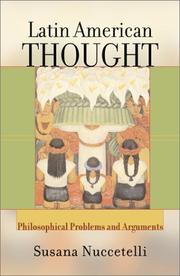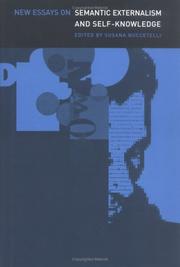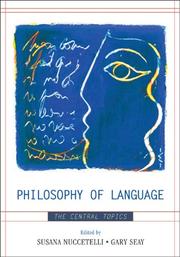| Listing 1 - 10 of 16 | << page >> |
Sort by
|

ISBN: 0813365538 Year: 2002 Publisher: Boulder Westview
Abstract | Keywords | Export | Availability | Bookmark
 Loading...
Loading...Choose an application
- Reference Manager
- EndNote
- RefWorks (Direct export to RefWorks)
Filosofie [Latijns-Amerikaanse ] --- Philosophie latino-américaine --- Philosophy [Latin American ] --- Indian philosophy --- Philosophy, Latin American --- Latin American philosophy --- Indians --- Philosophy, Indian --- Philosophy --- Latin America
Book
ISBN: 0262280779 0585482691 9780262280778 9780585482699 Year: 2003 Publisher: Cambridge, Mass. : MIT Press,
Abstract | Keywords | Export | Availability | Bookmark
 Loading...
Loading...Choose an application
- Reference Manager
- EndNote
- RefWorks (Direct export to RefWorks)
Externalism (Philosophy of mind) --- Self-knowledge, Theory of. --- Self-knowledge, Theory of --- Speculative Philosophy --- Philosophy --- Philosophy & Religion --- Introspection (Theory of knowledge) --- Knowledge, Reflexive --- Knowledge of self, Theory of --- Reflection (Theory of knowledge) --- Reflexive knowledge --- Knowledge, Theory of --- Personality (Theory of knowledge) --- Self (Philosophy) --- Philosophy of mind
Book
ISBN: 9781107667181 9781107067646 9781107705562 1107067642 Year: 2020 Publisher: Cambridge Cambridge University Press
Abstract | Keywords | Export | Availability | Bookmark
 Loading...
Loading...Choose an application
- Reference Manager
- EndNote
- RefWorks (Direct export to RefWorks)
"Chapter 1 Setting the Scene: The Iberian Conquest In Latin America, a number of philosophical doctrines developed as responses to some mainstream views of the Iberian colonial period - which extended, roughly, from the late 1500s to the early 1800s. This chapter looks closely at four doctrines whose central themes can be traced to that period. It begins by examining the doctrines of Bartolomé de las Casas (1474-1566) and Francisco de Vitoria (1486-1546) on the moral status of the actions of Spain, their native nation, during the early stages of the European modern expansion. From these doctrines of practical ethics and political philosophy, the chapter turns to José de Acosta (ca. 1539-1600) and his objections to Scholasticism in epistemology and philosophy of science. Pressured by the new physical and social realities of the Americas, these Spanish thinkers came to question the philosophical establishment of Spain and Portugal. As shown in the discussion here, in their ways they challenged some applications of the official philosophy of Roman Catholic Church, Thomism, that were common in these countries during the sixteenth century. A fourth doctrine considered below, by twentiethcentury Mexican philosopher and historian Edmundo O'Gorman (1906-1995), offers an anti-realist rejection of some beliefs about the "discovery" of America. Although O'Gorman's anti-realism is not altogether original, its application to this issue is. It also suggests that the end of the colonial period was far from marking the end of philosophical reflection on the Iberian expansion"--
Political philosophy. Social philosophy --- General ethics --- History of philosophy --- Latin America --- Philosophy, Latin American --- Philosophy

ISBN: 0262140837 Year: 2003 Publisher: Cambridge (Mass.) MIT press
Abstract | Keywords | Export | Availability | Bookmark
 Loading...
Loading...Choose an application
- Reference Manager
- EndNote
- RefWorks (Direct export to RefWorks)
Theory of knowledge --- Externalism (Philosophy of mind) --- Self-knowledge, Theory of --- Introspection (Theory of knowledge) --- Knowledge, Reflexive --- Knowledge of self, Theory of --- Reflection (Theory of knowledge) --- Reflexive knowledge --- Knowledge, Theory of --- Personality (Theory of knowledge) --- Self (Philosophy) --- Philosophy of mind
Book
ISBN: 1107705568 1009028596 1009028316 1107067642 Year: 2020 Publisher: Cambridge : Cambridge University Press,
Abstract | Keywords | Export | Availability | Bookmark
 Loading...
Loading...Choose an application
- Reference Manager
- EndNote
- RefWorks (Direct export to RefWorks)
Latin American philosophy is best understood as a type of applied philosophy devoted to issues related to the culture and politics of Latin America. This introduction provides a comprehensive overview of its central topics. It explores not only the unique insights offered by Latin American thinkers into the traditional pre-established fields of Western philosophy, but also the many 'isms' developed as a direct result of Latin American thought. Many concern matters of practical ethics and social and political philosophy, such as Lascasianism, Arielism, Bolívarism, modest and immodest feminisms, republicanism, positivism, Marxism, and liberationism. But there are also meta-philosophical 'isms' such as originalism and perspectivism. Together with clear and accessible discussions of the major issues and arguments, the book offers helpful summaries, suggestions for further reading, and a glossary of terms. It will be valuable for all readers wanting to explore the richness and diversity of Latin American philosophy.
Philosophy, Latin American. --- Philosophy --- Mental philosophy --- Humanities --- Latin American philosophy
Book
ISBN: 9781138818484 9781138818491 Year: 2022 Publisher: London : Routledge,
Abstract | Keywords | Export | Availability | Bookmark
 Loading...
Loading...Choose an application
- Reference Manager
- EndNote
- RefWorks (Direct export to RefWorks)
G.E. Moore's Principia Ethica is a landmark publication in twentieth-century moral philosophy. Through focusing on the origin and evolution of his main doctrines this guidebook makes it clear that Moore was an innovator whose provocative take on traditional philosophical problems instigated debate amongst philosophers. Principia Ethica is an important text for those attempting to understand and engage with the major philosophical debates in ethics today. The Routledge Guidebook to Moore's Principia Ethica provides a comprehensive introduction to this historic text, examining key Moorean themes including.
Ethics. --- Moore, G. E.

ISBN: 0742559777 1461640873 9780742559776 9781461640875 9780742559769 0742559769 1299794920 Year: 2008 Publisher: Lanham, Maryland : Rowman & Littlefield Publishers,
Abstract | Keywords | Export | Availability | Bookmark
 Loading...
Loading...Choose an application
- Reference Manager
- EndNote
- RefWorks (Direct export to RefWorks)
This collection of classic and contemporary essays in philosophy of language offers a concise introduction to the field for students in graduate and upper-division undergraduate courses. It includes some of the most important basic sources in philosophy of language, as well as new essays by scholars on the leading edge of innovation in this increasingly influential area of philosophy. Each chapter is preceded the editors' introduction.
Language and languages --- Philosophy. --- Philosophy --- Language and languages - Philosophy
Book
ISBN: 9780521192422 9781139204385 1139204386 0521192420 9781139205962 113920596X 9780511894633 0511894635 9781139202978 9781107677777 1139199366 1107223156 1280484241 9786613579225 1139205161 1139202979 1139201565 1107677777 Year: 2011 Publisher: Cambridge Cambridge University Press
Abstract | Keywords | Export | Availability | Bookmark
 Loading...
Loading...Choose an application
- Reference Manager
- EndNote
- RefWorks (Direct export to RefWorks)
Ethical naturalism is narrowly construed as the doctrine that there are moral properties and facts, at least some of which are natural properties and facts. Perhaps owing to its having faced, early on, intuitively forceful objections by eliminativists and non-naturalists, ethical naturalism has only recently become a central player in the debates about the status of moral properties and facts which have occupied philosophers over the last century. It has now become a driving force in those debates, one with sufficient resources to challenge not only eliminativism, especially in its various non-cognitivist forms, but also the most sophisticated versions of non-naturalism. This volume brings together twelve new essays which make it clear that, in light of recent developments in analytic philosophy and the social sciences, there are novel grounds for reassessing the doctrines at stake in these debates.
Ethics, Evolutionary --- Naturalism --- Materialism --- Mechanism (Philosophy) --- Philosophy --- Positivism --- Science --- Ethics, Naturalistic --- Evolutionary ethics --- Naturalistic ethics --- Ethics --- Ethical relativism --- Ethics, Evolutionary. --- Naturalism. --- Arts and Humanities

ISBN: 1281153923 9786611153922 0191535923 9780191535925 9781281153920 9780199281725 0199281726 138304273X Year: 2007 Publisher: Oxford Oxford university press
Abstract | Keywords | Export | Availability | Bookmark
 Loading...
Loading...Choose an application
- Reference Manager
- EndNote
- RefWorks (Direct export to RefWorks)
These 13 original essays, whose authors include some of the world's leading philosophers, examine themes from the work of the Cambridge philosopher G.E. Moore, and demonstrate his considerable continuing influence on philosophical debate.
Knowledge, Theory of. --- Ethics. --- Deontology --- Ethics, Primitive --- Ethology --- Moral philosophy --- Morality --- Morals --- Philosophy, Moral --- Science, Moral --- Philosophy --- Values --- Epistemology --- Theory of knowledge --- Psychology --- Moore, G. E. --- Moore, George Edward, --- Mūra, Jī. Ī., --- Ethics --- Knowledge, Theory of --- Moore, G. E.,
Digital
ISBN: 9780511894633 Year: 2012 Publisher: Cambridge Cambridge University Press
Abstract | Keywords | Export | Availability | Bookmark
 Loading...
Loading...Choose an application
- Reference Manager
- EndNote
- RefWorks (Direct export to RefWorks)
| Listing 1 - 10 of 16 | << page >> |
Sort by
|

 Search
Search Feedback
Feedback About UniCat
About UniCat  Help
Help News
News